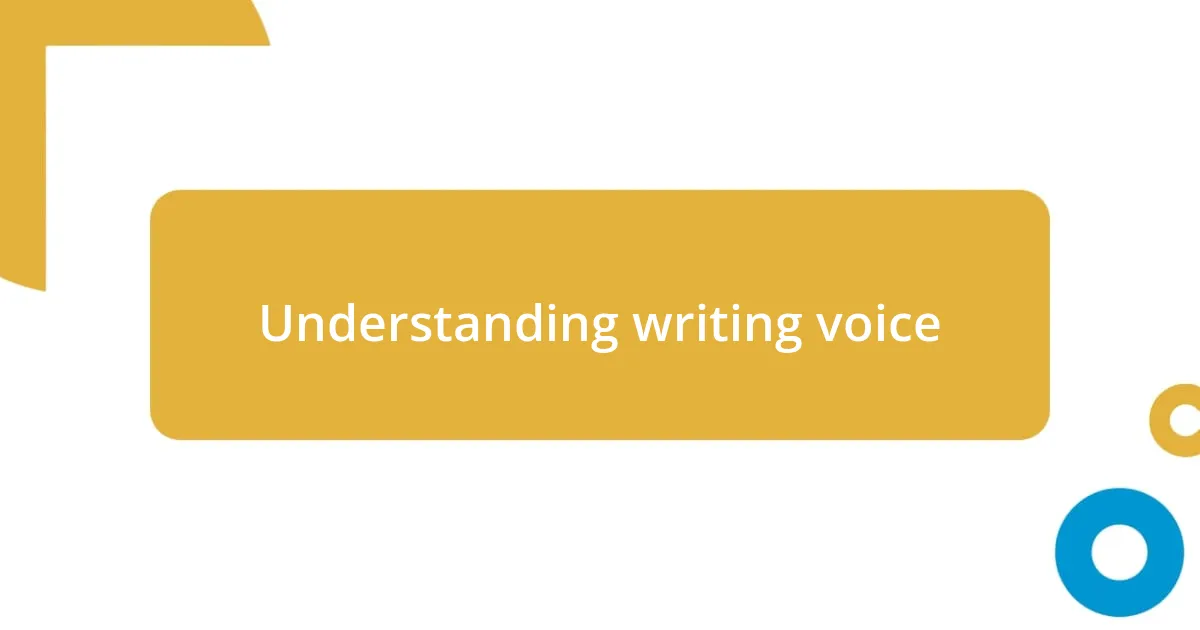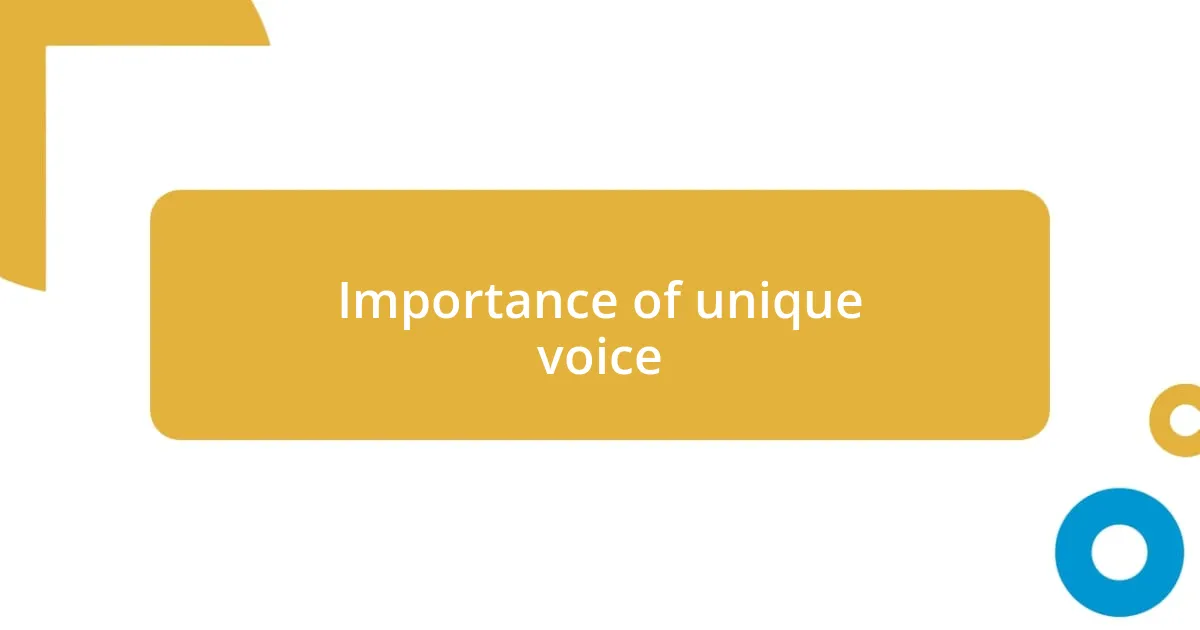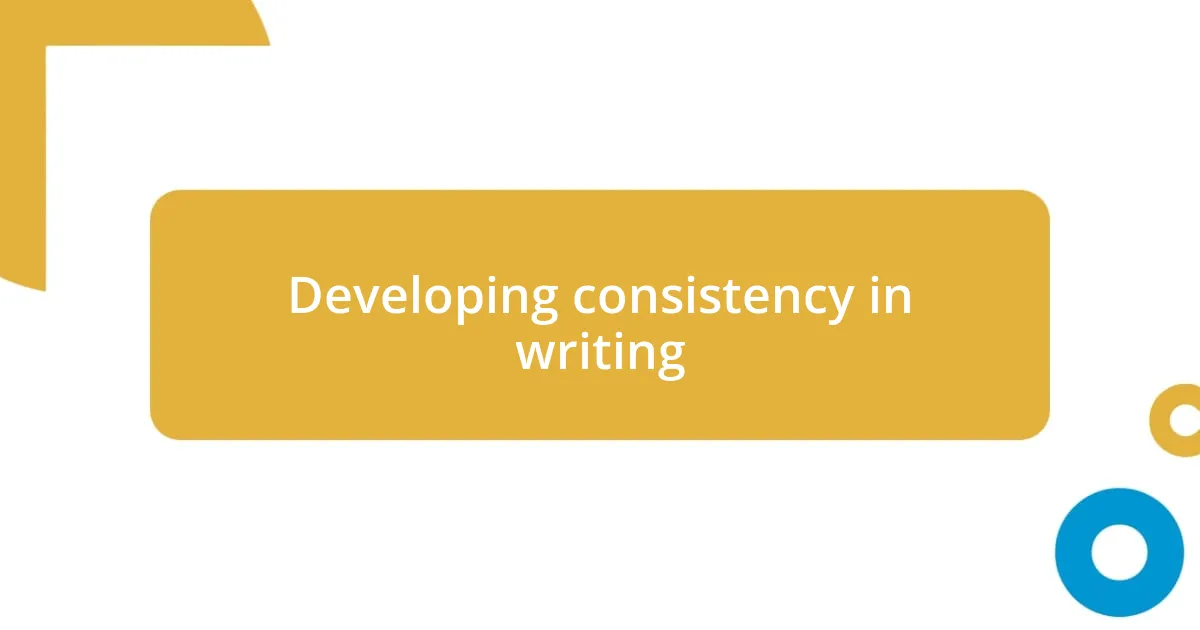Key takeaways:
- Writing voice is a unique reflection of the writer’s personality that evolves over time through personal experiences.
- Cultivating a distinct voice fosters authentic connections with readers and enhances the memorability of one’s writing.
- Experimentation and self-reflection are essential for discovering and refining one’s natural writing style.
- Feedback from others can offer valuable insights, helping to shape and strengthen a writer’s voice.

Understanding writing voice
Writing voice is much more than just a collection of words; it’s the unique fingerprint of a writer’s personality that comes through in their work. I remember a time when I read my old journal entries, realizing how different my voice sounded then compared to now. Have you ever looked back at something you wrote years ago and thought, “Who was that person?” It’s fascinating how our experiences shape our voice over time.
Finding your writing voice often feels like peeling back layers to discover the core of who you are as a writer. I went through a phase where I mimicked popular authors, attempting to fit into their molds. But each time I tried to write like them, I felt unsatisfied and disconnected. It’s a bit like wearing someone else’s shoes—you might get somewhere, but they don’t quite fit, do they?
The emotional journey to understanding your writing voice is essential. There were moments of doubt when I questioned if my voice was “good enough.” But gradually, I learned to embrace my quirks and imperfections. Have you ever felt that little spark of recognition when a line resonates deeply with you? That’s your voice making itself known, and it’s something to nurture and celebrate.

Importance of unique voice
Cultivating a unique writing voice is crucial in connecting with readers on a deeper level. I’ve found that when I write in my authentic voice, I attract the kind of audience that genuinely resonates with my message. There’s something powerful about sharing your true self; it invites others into your world, creating a bond that goes beyond mere words. I recall an instance where I shared a piece about my struggles with anxiety. The feedback was overwhelming, with many readers expressing their appreciation for my honesty. It felt like stepping into the light, knowing my voice was making a difference.
A distinctive voice can set you apart in a sea of content. Here are some key reasons why finding and nurturing your unique voice matters:
- Builds Authentic Connection: Readers sense authenticity and are drawn to voices that resonate with their own experiences.
- Enhances Memorability: An original voice makes your writing more memorable, creating lasting impressions that keep readers coming back.
- Fosters Trust: Authenticity breeds trust; readers are more likely to believe and engage with those who speak from the heart.
- Encourages Expression: A unique voice empowers you to express thoughts and feelings freely, enriching your writing journey.
- Reflects Your Identity: Your voice is a reflection of your identity, allowing you to share your worldview and experiences uniquely.

Discovering your natural style
Finding your natural style is a personal journey that requires patience and self-reflection. I vividly remember sitting at my desk one rainy afternoon, scribbling thoughts that had been swirling in my mind. In that moment, I felt free, and it struck me that my true style shone through the simple act of writing what excited me most. It’s almost like discovering a hidden room in your home; once you open the door, you realize there’s so much more to explore.
The trick to uncovering your natural style lies in embracing your preferences and experiences. I often experimented with different genres and tones, from playful poetry to serious essays, noticing how each change affected how I felt while writing. Have you ever tried writing in a genre that completely surprised you? For me, it was when I attempted humor, and although the initial attempts made me cringe, I eventually found a quirky humor woven into my storytelling. It felt like unlocking a part of myself that had always wanted to emerge.
Another important aspect is understanding that your voice may evolve over time. As I navigated through various life stages, my writing naturally adapted, resonating with different emotions and experiences. I distinctly recall drafting a piece about a significant life change, pouring my heart into every word, and realizing that vulnerability became my greatest strength as a writer. Each time I wrote, I connected deeper not just with my words, but with myself as well.
| Experimentation | Embracing Authenticity |
|---|---|
| Trying different genres and tones can help identify what resonates with you. | Being honest with your feelings and experiences enhances your natural style. |
| Writing in a genre outside of your comfort zone can reveal hidden strengths. | Your unique perspective shapes the authenticity of your writing voice. |

Techniques for experimenting with voice
Experimenting with your writing voice can be both thrilling and daunting. I remember the first time I decided to write a short story from the perspective of my dog. It might sound silly, but tapping into that playful mindset helped me loosen up. Have you ever tried to step outside your own shoes when writing? It’s like tasting a new flavor—you might find something you didn’t know you loved.
Another technique that really helped me was free writing. I would set a timer for ten minutes and write without any interruptions or self-critique. In one freewrite session, I stumbled upon a raw emotional honesty that I hadn’t accessed before. It felt liberating to just let the words flow, unfiltered. The result? My writing became more genuine, and my voice emerged stronger. How often do you give yourself the freedom to write without judgment?
Don’t shy away from feedback either. I found that sharing drafts with trusted friends can open my eyes to new elements in my voice I hadn’t even noticed. One friend pointed out how my use of humor lightened a particularly heavy topic, making my message resonate even more. It was a revelation! Engaging with others can help reshape your perspective, allowing your voice to evolve naturally. Have you considered how your circle could aid in your writing journey?

Analyzing your favorite writers
When analyzing your favorite writers, pay attention to what draws you to their work. I find that it’s often their unique way of expressing emotions that resonates deeply. For instance, I adore how Maya Angelou captures human experiences with such elegance—her words have a musicality that just sticks with me. Have you ever finished a line and felt like it echoed in your mind long after reading it? That’s the power of distinct voice.
Another thing to dissect is their choice of words and rhythm. I appreciate writers like Neil Gaiman, who weave whimsical yet profound narratives. I remember reading one of his stories and feeling as if I had been transported to another world, utterly captivated by the interplay of language and imagery. It got me thinking: how does your favorite author create mood through their word choices? That kind of analysis can reveal technique and intention that might influence your own writing.
Lastly, consider their thematic choices and how they interlace personal beliefs with storytelling. Jim Morrison’s lyrics, for example, always felt like a direct line into his soul, grappling with love and freedom. Reflecting on why certain themes resonate with you can ignite a spark for your own writing. What themes do you gravitate towards, and how do they shape your voice? This exploration will guide you in understanding what you want your own writing to convey.

Developing consistency in writing
Developing consistency in writing is like building a muscle; it requires dedication and a clear routine. I recall the early days of my writing journey when I tried to write at random times, hoping inspiration would strike. It didn’t take long to realize that waiting for that spark was a recipe for frustration. Have you ever felt that pressure? Establishing a writing schedule transformed my approach—it anchored my practice and gave my voice the chance to emerge more clearly over time.
I also found that setting specific goals helped me maintain a steady rhythm. When I aimed to write a certain number of words each day, I could see my progress, which fueled my motivation. One day, while struggling to hit my target, I let my frustration morph into curiosity, asking myself what topic excited me that day. That simple shift in focus not only propelled my word count but also aligned my writing with my current state of mind. Have you ever adapted your goals to match your mood? It can make a huge difference.
Moreover, I discovered that sticking to a familiar style across different pieces created a sense of coherence in my body of work. I began to recognize my preferred themes and recurring motifs, which helped form a consistent narrative thread. This realization hit home when I re-read a series of blog posts I’d written; they echoed the same sentiment, connecting my thoughts seamlessly. It felt rewarding! How do you track your style and themes? Embracing this pattern not only solidified my voice but also made my writing feel more authentic.

Refining your voice over time
Refining your voice is a continuous process, and I often find that it requires patience and self-awareness. In my early attempts at writing, I remember feeling like I was wearing someone else’s clothes—everything felt off. It wasn’t until I re-evaluated my style, stripping away unnecessary flourishes and focusing on my natural inclinations, that I felt more at home in my words. Have you ever tried to fit into a style that just didn’t feel right? That moment of realization can be quite liberating.
As I penned more pieces, I began to notice how my voice evolved with my experiences. There’s something profound about writing through different life stages; each chapter brings a fresh perspective. I can distinctly recall the shift in my tone after going through a challenging period. I shifted from a more superficial style to a deeper, introspective one that allowed me to connect with readers on a more personal level. Have you had a transformative experience that changed how you express yourself in writing? It’s as if each lesson adds another layer to your voice.
In reflecting on feedback from readers, I discovered invaluable insights about how my voice resonated with others. On one occasion, a reader shared how my storytelling helped them navigate a tough time, which struck a chord with me. That moment underscored the importance of refining my voice not just for myself but for my audience. Have you ever received feedback that reshaped your approach? Those dialogues can be pivotal in honing your style, leading to a voice that feels both authentic and impactful over time.














